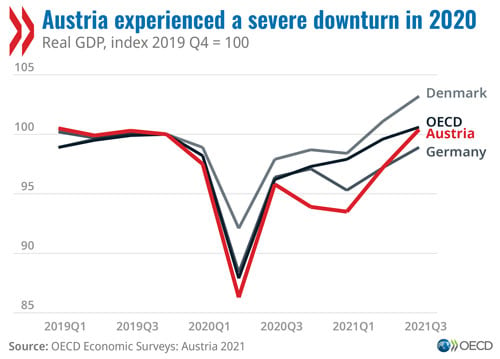20/12/2021 – Austria’s economy is recovering well from the COVID-19 crisis thanks to decisive policy action, although challenges remain in the form of labour and skills shortages. Efforts should now focus on increasing the labour force participation of women and older workers, adjusting public finances once the recovery is fully self-sustained, and accelerating the shift to a greener and widely digitalised economy, according to a new OECD report.
The latest OECD Economic Survey of Austria says that while support should continue to sectors still affected by the pandemic, such as tourism and hospitality, prioritisation procedures and expenditure reviews should be put in place to create fiscal space for new investments and manage the pressure on public finances from population ageing. European recovery funds need to be invested with a view to increasing business dynamism and productivity growth. Surmounting the crisis will also require labour and capital re-allocations towards more digitalised and less carbon-intensive activities.
“Austria’s swift and effective policy response to the pandemic significantly reduced the blow to incomes and jobs. Once through the latest wave of the pandemic, Austria will be back on the path of a sustained recovery,” OECD Secretary-General Mathias Cormann said, presenting the Survey alongside Minister for European and International Affairs Alexander Schallenberg, Minister of Finance Magnus Brunner and Minister for Digital and Economic Affairs Margarete Schramböck. “It will be key however to tackle labour and skills shortages, accelerate the transition to net zero, and address longer-term spending pressures,” Mr Cormann added.

After a severe downturn in 2020, then brisker-than-expected economic activity in the first three quarters of 2021, the three-week lockdown between November and December 2021 will temporarily weaken growth. However, the Survey projects the pace of GDP growth picking back up in 2022, as disruptions to international supply chains start to fade and tourists return.
Austria entered the COVID-19 crisis with high living standards, a well-performing health system, robust public finances, low unemployment and a strong social safety net. Swift and decisive government support has been effective in preserving jobs and investment. On the other hand, Austria has a higher debt-to-GDP ratio than comparable countries, productivity growth slowed in recent years and business dynamism is weak. The Survey recommends expanding high-speed Internet coverage, lowering barriers to competition, enhancing financing options for start-ups and helping small and medium-size firms to adopt advanced digital technologies.
Despite its high share of renewable energy, Austria has not managed to reduce the carbon intensity of its economy. Plans to phase in carbon prices starting from 2022 are welcome, yet it will be difficult to reach the country’s ambitious objective of carbon neutrality by 2040 based on current policies. Faster emissions cuts will be needed across all sectors, particularly in transport, buildings and industrial processes. This will require new regulations, higher carbon prices that are more harmonised across uses and sectors, and greater investment in research into emission-saving innovations.
The economic rebound has left some sectors, notably hospitality, facing labour bottlenecks that are weighing on firms’ ability to rebuild capacity. The departure of many immigrant workers to their home countries during the pandemic has amplified labour shortages, particularly in tourism where foreign-born workers make up 40% of the workforce. Austria needs to better integrate women, migrants and older workers into the labour market, particularly as population ageing will reduce the labour force over time. Improving access to and quality of childcare, particularly in rural areas, would make it easier for mothers to return to work. Skill mismatches also risk dampening the recovery, making it a priority to increase training for the low-skilled and long-term unemployed. Geographic labour mobility should be encouraged.
See a Survey Overview with key findings and charts (this link can be used in media articles).Working with over 100 countries, the OECD is a global policy forum that promotes policies to preserve individual liberty and improve the economic and social well-being of people around the world.
